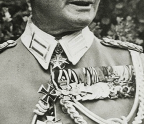MUTINY ON THE RHINE


What now? Germanicus Julius Caesar, governor of Tres Galliae and Germania, might have wondered such as he opened the dispatch. It was mid-September in ad 14. A month earlier he’d received in similar fashion the dark and momentous news that Imperator Caesar Divi filius Augustus, first man of the Roman empire, was dead. The same dispatch communicated that Tiberius, Germanicus’ uncle, had assumed the throne. That came as no surprise, for while Augustus had not legally designated Tiberius as his political successor, he had adopted him as a son and given him a share of imperial power and responsibility. To maintain political stability Augustus had also required Tiberius to adopt Germanicus, whose father had died, as his eldest son and heir. Put plainly, the earlier dispatch from Rome had informed Germanicus he stood next in line to the most powerful leader in the Western world.
Since then little had changed in the northern provinces. Germanicus retained his posts under Tiberius, who followed Augustus’ final instructions to maintain rather than seek to expand the frontiers. In addition to his administrative responsibilities Germanicus was in overall command of eight legions on the Rhine River. His force was subdivided into two provincial commands—one in Germania Inferior, bordering the North Sea, the other in Germania Superior, bordering the Alps. Across the river was Germania Magna. Laced with rivers and swamps, it was an untamed and unconquered region, whose dark, forbidding forests had swallowed whole legions.
The frontier had been quiet of late, but Germanicus remained watchful for incursions from across the river. He had been in Gallia Belgica, overseeing the completion of a census to assess property taxes, when he received the second dispatch from Rome. He likely worried it carried news the Germanic tribes had risen and were threatening an invasion. But the news was even worse: The Roman army of the Rhine had mutinied.
You’re reading a preview, subscribe to read more.
Start your free 30 days





